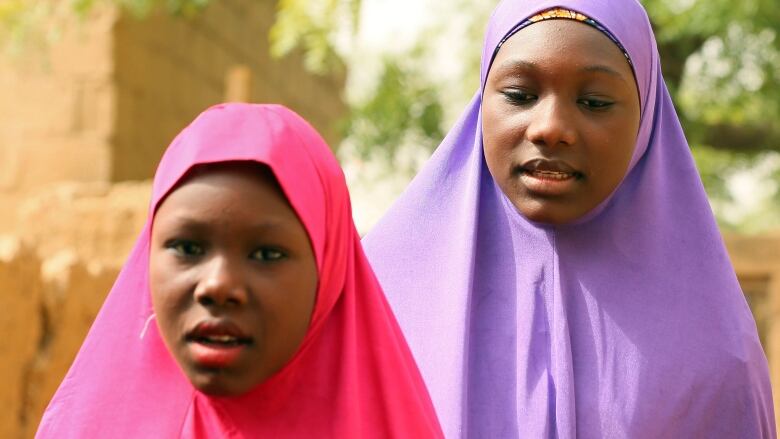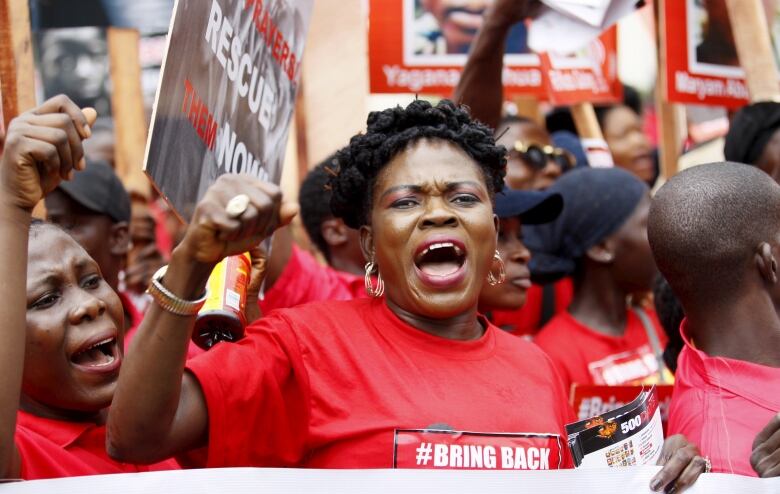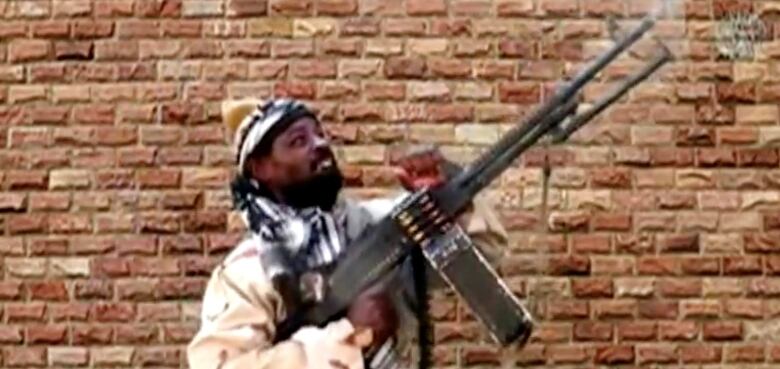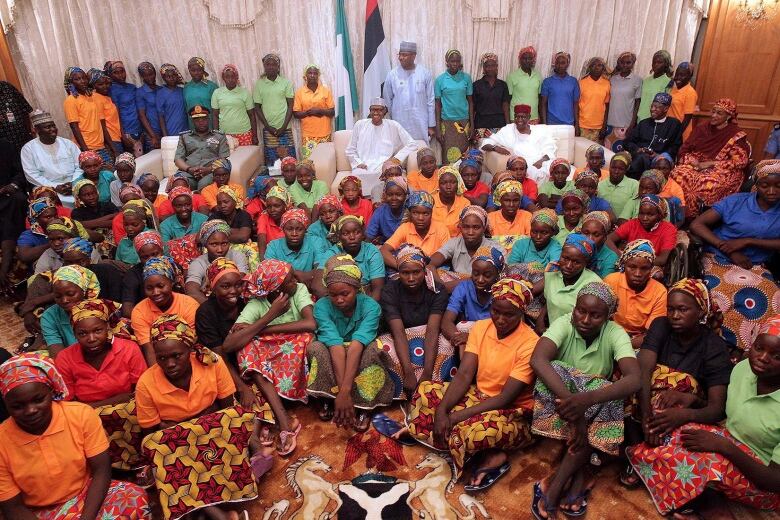Another suspected Boko Haram kidnapping in Nigeria: The cycle continues
Government leaders long ago declared Boko Haram's defeat, but more than 100 schoolgirls disappeared this week

"It's like we have been thrown back to the abysmal darkness of April 2014 all over again,"says Aisha Yesufu, one of the founders of the #bringbackourgirls movement in Nigeria.
"Unbelievably the Nigerian government did not learn anything from the Chibok girls' abduction," she tells the CBC from the Nigerian capital Abuja.
"The April 2014 scenario is being played out again."
It is a sentiment shared by many watching and waiting for information on a group of girls missing since Monday from their school in the remote town of Dapchi in the northeastern state of Yobe. They did not return after suspected Boko Haram militants raided their school.
There has been misinformation anda muddle of conflicting figures from various authorities with estimates on the number of missing girls ranging between 46 and 111; parents say they have a list of 105 names.There was false hope when the local government issued a statement saying a group had been rescued by the military but that was later retracted and denied.
- More than 90 Nigerian schoolgirls feared missing
-
Nigerian troops arrest 400-plus Boko Haram fighters, families
It's not the first time there has been confusion on such basic facts, the same happened in 2014 when the Chibok school girls were kidnapped by Boko Haram, there were denials, claims and counter claims before details started to emerge. It is often difficult to establish exact and accurate numbers on a Boko Haram attack. The locations are often remote, difficult or dangerous to access, communications poor and various military or government agencies offerdiffering accounts.
'A national disaster'
NigerianPresident MuhammaduBuharion Friday described the situation as "a national disaster," promisingin a statementto "find and safely return all the missing girls."
Nigeria is due to hold general and presidential elections in February 2019. It's not yet known if Buhari will stand again for re-election. But given that he came to power in 2015 promising to end the Boko Haram crisis once and for all, this latest attack will not play well for him into any political agenda.

And, as in 2014 when 200 Chibok schoolgirls were kidnapped, many are in disbelief.
"Families are distraught and heartbroken," said activist R. Evon Benson-Idahosa.
Speaking from Abuja, the founder and human rights lawyer at Pathfinders Justice Initiative, a non-governmental organization campaigning against the exploitation of women and girls, said many feel personally devastated.
"Those that were supposed to protect their children have failed them and are now in the process of utilizing them as political pawns."
BokoHaram persists
Nigerian politics plays deep into the Boko Haram story. The Islamist militant group has waged a bloody and violent insurgency in Nigeria since 2009, saying it is fighting for its own caliphate in the northeast.
Its leader, Abubakar Shekau a manthe Nigerian military has declared dead several times, but who continues to appear in Boko Haram's propaganda videospledged their allegiance to the so-called Islamic state group in 2015.

At least 20,000 people have died during the conflict. It has also left two million people homeless.
Marie-Pierre Poirier, UNICEF'sregional director for West and Central Africa, has expressed concern about what she described as "brutal acts of violence."
In a statement, she said "attacks on schools are a violation of children's rights and international humanitarian law and that"schools should be safe spaces and protected at all times."
But just like Chibok, it would seem that the students of Dapchi were vulnerable to attack and had little, if any, real protection.
- 82 Chibok girls are free of kidnappers but still not home
- Why now? Questions raised over Nigerian schoolgirls' release may never be answered
- Some Nigerian schoolgirls unwilling to leave Boko Haram
Since 2009, more than2,295 teachers have been killed and almost 1,400 schools destroyed as a result of the conflict, according to UNICEF.
'Still thriving and not desperate'
"Boko Haram is still thriving and not desperate," said Yan St.Pierre, CEO and counter terrorism advisor of the Berlin-basedsecurity firmMOSECON.
"It is in a position to kidnap people on a near-daily basis if we include the attacks in Cameroon's extreme north and those in Niger's Diffa region" he said.
Boko Haram has been blamed for attacks on the porous borders of neighbouring Niger and Cameroon.
St. Pierre does not believe this latest school attack in Dapchi was just luck."Boko Haram still has enough resources and personnel to carry significant attacks at will."

During the past nine years, the Chibok schoolgirls kidnapping may well have become BokoHaram's most high-profile attack, but the group has, analysts believe, abducted thousands more, although there are no official figures.
In November 2014,Boko Haram seized at least 300 elementary school children in the town of Damasak.
Human Rights Watch described it as "the largest documented school attack by BokoHaram militants."As the military moved in some months later to retake the town, Boko Haram took the children and they have not been seen since.
Kidnapping has become a tactic that Boko Haram has successfully deployed.
"The goal is to integrate them into the 'workforce,' either as fighters (male) or wives and caretakers (women)," St. Pierre said by email. "Both genders are also used as suicide bombers for the organization."
Buhari came to power on a promise to defeat Boko Haram once and for all, but that has yet to happen.
Raids, kidnappings and suicide attacks
In December 2015, PresidentBuhari a former military ruler declared thatBokoHaramwas "technically defeated."
Earlier this year, senior military commanders in the northeast saidBokoHaramwas "completely defeated."
Interior ministerAbdulrahmanDambazzauthis month said they were "completely decimated"."
Yet, on the ground, the raids, kidnappings, andsuicide attacks which often use young girls have persisted.

In Dapchi, with retractions, contradictions and confusion, the frustration has already boiled over into anger. Youths threw missiles at the visiting Yobe state governor's convoy, smashing windscreens and setting tires alight.
This latest Boko Haramattack raises questions about the government's grip on security in the northeast, similar to those following the Chibok girls kidnappings in 2014.

More than 100 of the girls kidnapped four years ago are still missing.
"Boko Haram is still a threat," St Pierre said. "They can still attack at will and are now easily attacking areas that the Nigerian government declared 'secured.'"
"This is a war," he said, "that will continue for a very long time."












_(720p).jpg)


 OFFICIAL HD MUSIC VIDEO.jpg)
.jpg)



























































































